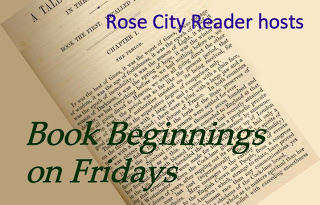Today we have a historical mystery, The Widows of Malabar Hill by Sujata Massey, for Book Beginnings on Fridays.
Book Beginnings is a fun meme hosted by Rose City Reader blog. To participate, share the first sentence or so of a novel you are reading and your thoughts about it. When you are finished, add your URL to the Book Beginnings page linked above. Hope to see you there!
The Widows of Malabar Hill by Sujata Massey
(*Amazon Affiliate link)
I have read and enjoyed a couple of the novels in Sujata Massey’s Rei Shimura mystery series, which are (initially) set in contemporary Japan. In a noticeable departure, this novel is set in Bombay in the 1920s.
Summary: Perveen Mistry has just joined her father’s law practice, making her one of the first female lawyers in India. When she notices that the three wives of a deceased wealthy businessman have all relinquished their inheritance, Perveen decides to find out why. Someone is trying to hide the truth, however, and that person is willing to resort to murder. Perveen must figure out what is going on before anyone else is harmed.
First Sentence:
A Stranger’s Gaze
Bombay, February 1921On the morning Perveen saw the stranger, they’d almost collided.
Perveen had come upon him half-hidden in the portico entrance to Mistray House. The unshaven, middle-aged man appeared as if he’d slept for several days and nights in his broadcloth shirt and grimy cotton dhoti that hung in a thousand creases from his waist to his ankles, His small, squinting eyes were tired, and he exuded a rank odor of sweat mixed with betal nut.
Discussion:
Does it work for you when the author simply states the “where” and “when” at the beginning of the chapter like Massey does here?
Sometimes authors artfully incorporate that information in the first few sentences, but I like when they simply state it, too. I prefer when the author does give away some information about who, where, and when up front rather than leaving us guessing.
I also like that she includes enough information for the reader to figure out that a dhoti might be similar to pants since it hangs from his waist to ankles.
What do you think? Have you read The Widows of Malabar Hill? Would you like to?





